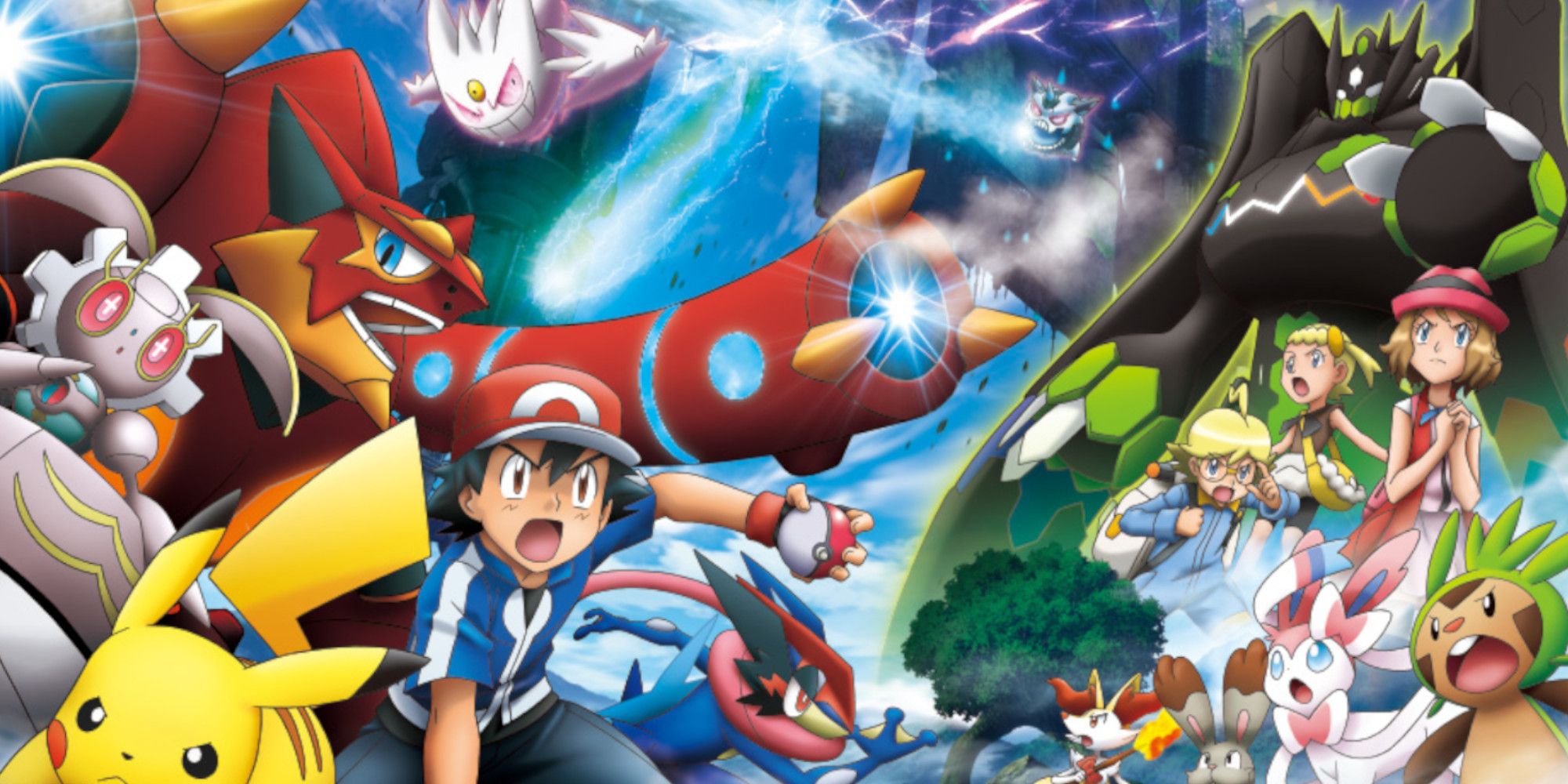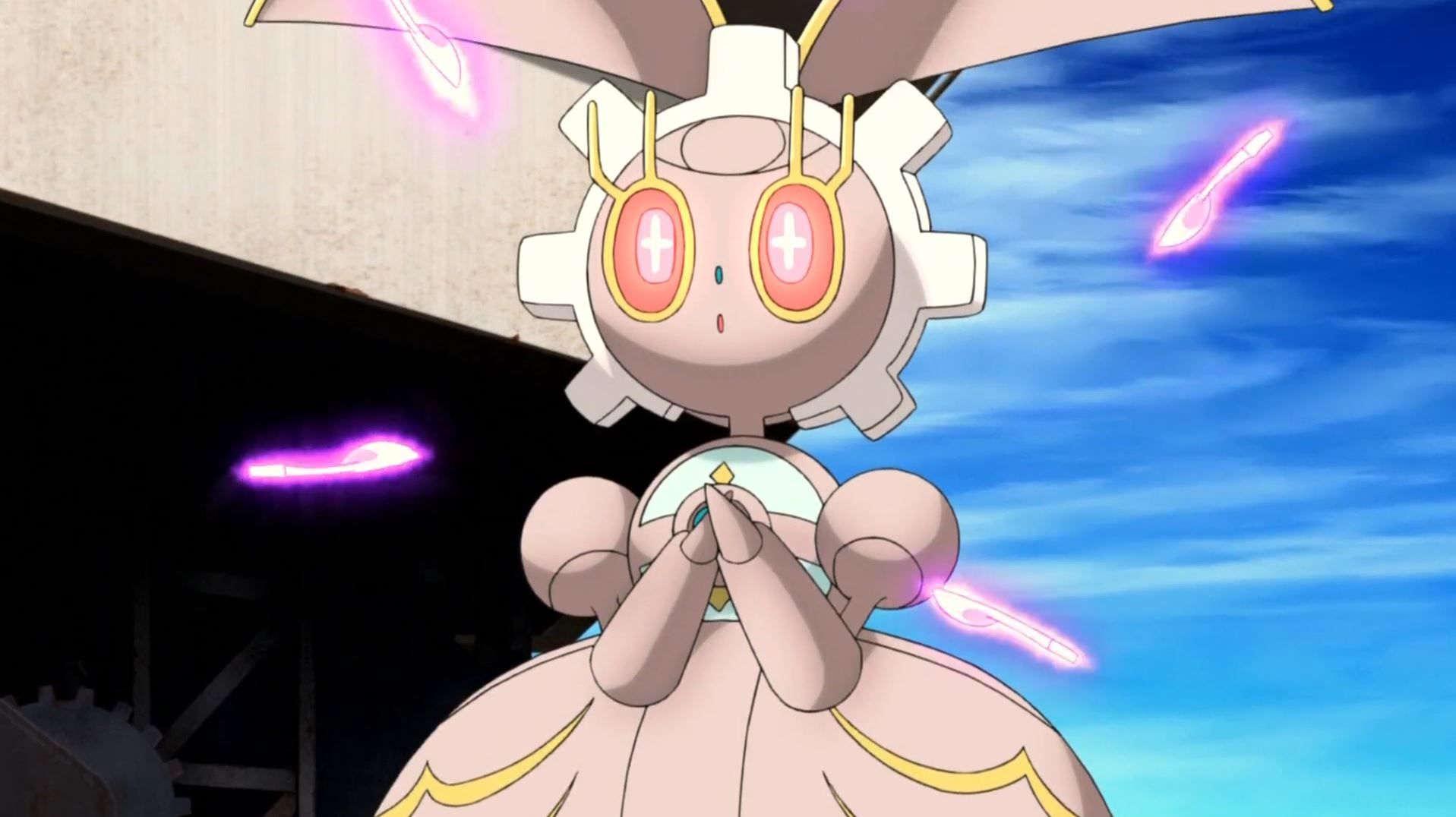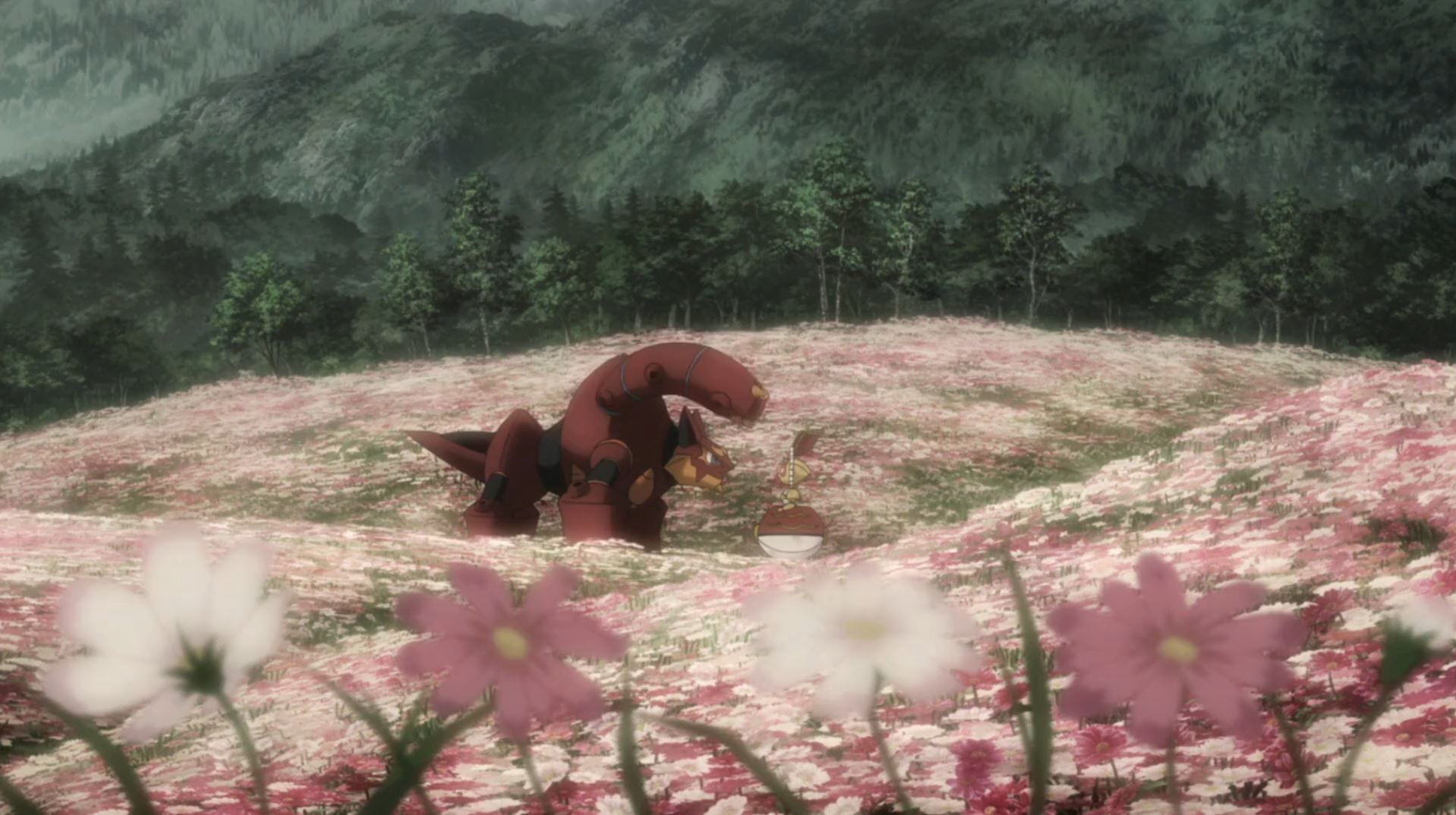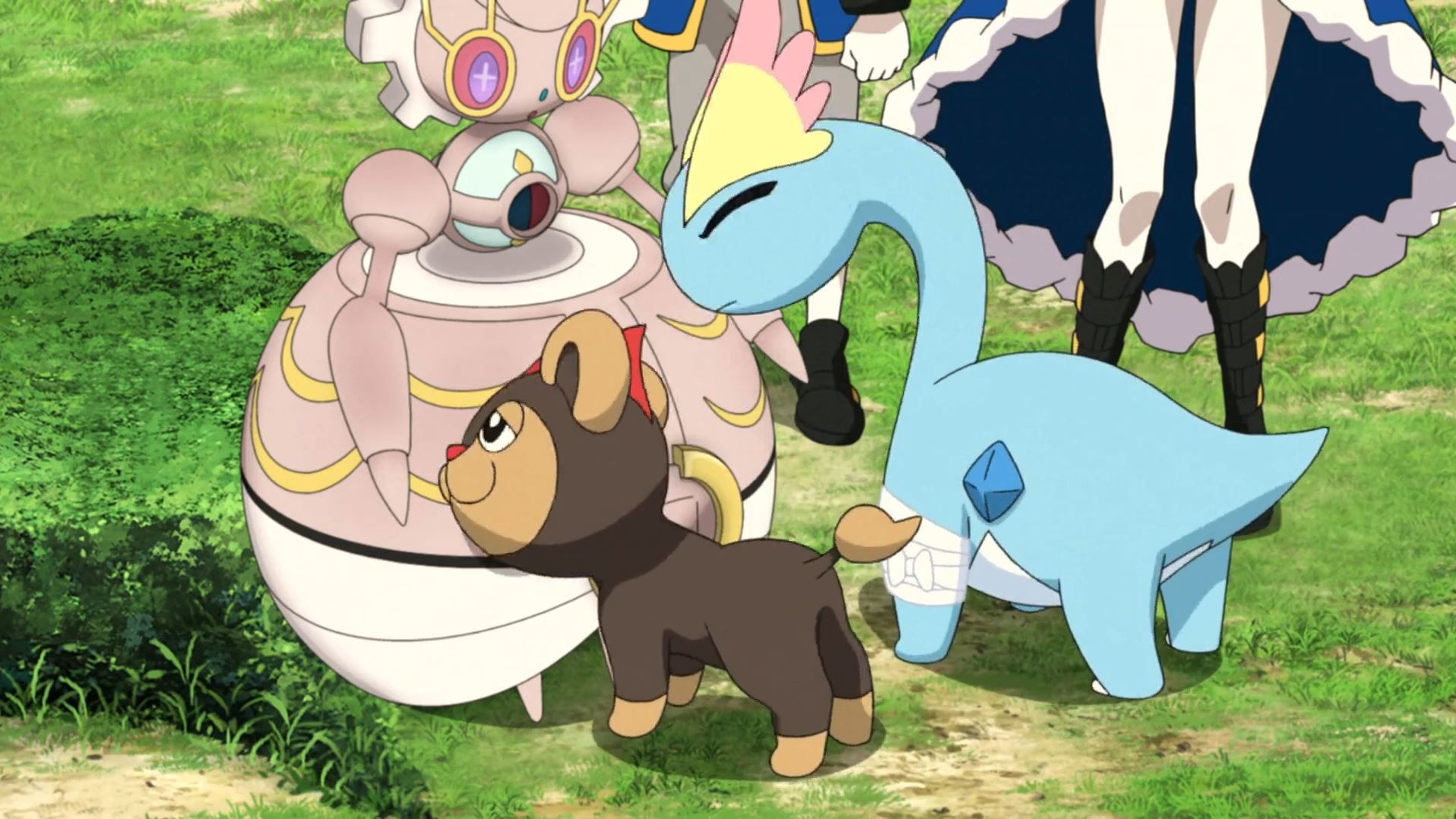Welcome back to Pokemon Movies in Review, a weekly recap of the entire Pokemon cinematic universe. This week we’re revisiting 2016’s Volcanion and the Mechanical Marvel, the 20th film in the series, the last movie in the X & Y generation, and the final entry before the series rebooted in an alternate continuity with Pokemon the Movie: I Choose You!
Volcanion and the Mechanical Marvel isn’t nearly as bombastic or thrilling as 2015’s Hoopa and the Clash of Ages - which would have been a great film to end the series on - but it hones in on the core themes of the Pokemon series in a way that gives it symmetry and a nice sense of finality.
Volcanion and the Mechanical Marvel holds its cards a lot closer to the vest than any other Pokemon movie, to the point where we aren’t really introduced to the villain or his motivations until nearly halfway through. The opening scene shows Volcanion pursuing an airship across the sky. As it lands on the ship, the pilot sends out an Alakazam and Glalie to fight it. Using a jeweled bracelet, the pilot activates a power called Mega Wave to mega evolve the two Pokemon - which any fan would tell you, is not how mega evolutions are supposed to work. As Volcanion fights Mega Alakazam and Mega Glailie, the pilot attached an electronic handcuff to its leg. He tries to attach a second handcuff, but Volcanion deflects it. Mega Glalie freezes Volcanion in a block of ice and sends it hurtling off the ship. It lands directly on Ash, causing the second handcuff to lock onto his waist. Volcanion recovers and takes off after the airship again, dragging Ash along for the ride.
Ash spends most of the movie handcuffed to Volcanion Roger Rabbit-style. It's an especially apt description, considering it turns out that Volcanion hates humans with a passion. When the pair catch up to the airship, it's revealed that it was bringing the Artificial Pokemon Magearna to the Azoth Kingdom, a clockpunk city powered by neo-arcane science. As we later learn, neo-arcane science was developed over 500 years ago by an inventor named Nikola, which brought great wealth to the city. One of his inventions was Magearna, the first man-made Pokemon. Magearna was designed with a special Soul-Heart that could be used to turn the city’s walls into a flying defense system in the event of an attack. This technology eventually led to an uprising as the people fought over control of the weapon. Nikola hid Magearna outside the city in a place called the Navel Plateau. There it met Volcanion, who used the Plateau as a sanctuary for Pokemon that had been abused and abandoned by their trainers. Now, an evil scientist named Alva kidnapped Magearna from the plateau so that he could activate the defense system and do a bunch of evil bad guy stuff.
Volcanion rescues Magearna and returns to the plateau, begrudgingly, with Ash in tow. The rest of the movie is essentially an examination of the relationship between humans and Pokemon, what makes them different, and people and Pokemon are better off together than separated. These are the questions Pokemon has been asking since Ash and Pikachu became friends in the first episode. In fact, Volcanion’s perspective and personality is almost identical to Mewtwo’s in the first Pokemon movie. While it doesn’t intend to liberate all Pokemon across the world as Mewtwo did, it believes that Pokemon should isolate away from humans. It believes that humans can’t be trusted, and as proof, he tells Ash about a Gulpin that lives on the Plateau who was abandoned by its trainer. “I don’t know if anything happened before that,” Volcanion says. “The only thing I know is right before its trainer left, he gave Gulpin a big hug.” Volcanion goes on to explain that every Pokemon on the plateau has been wounded by the selfishness and lies of humans. Pokemon are incapable of lying, it reasons, but humans are.
Ash proves Volcanion wrong as he has many times in the past: by showing it that not all humans are bad. He protects Magearna from a poacher that encounters them on their journey back to the plateau, and eventually helps fight Alva when he kidnaps Magearna once again and uses its Soul-Heart to power the defense system. Ash’s selfishness and commitment to protecting Pokemon wins Volcanion over. In the end, Volcanion invites Ash and his friends to be honorary Pokemon of the Navel Plateau.
Pokemon movies have a long history of asking complicated questions and failing to provide any answers, so it's fitting that Volcanion and the Mechanical Marvel would continue this trend to the very end. There are countless examples of Pokemon enhancing the lives of people. Whether through companionship, the application of their powers, or sometimes just using them for free labor like construction workers and firefighters, Pokemon have always made life better for people. Mechanical Marvel asks us to consider, then, what’s in it for Pokemon? They’re routinely abandoned, lied to, exploited, and traumatized by us, but when they’re left alone in a place like the Navel Plateau, they create their own communities and thrive. The fact that Ash is “one of the good ones” doesn’t change the fact that Pokemon seem to be better off on their own. Just as Mewtwo Strikes Back’s anti-violence message falls flat in a world where every conflict is solved by battling, Volcanion and the Mechanical Marvel tells us that people can’t be trusted, then fails to disprove that fact. I came away from this movie feeling Volcanion-pilled. No one should be able to capture and train Pokemon - except for Ash, of course.
As a rule, the Pokemon series doesn’t develop from one story to the next. It’s forever stuck in a time loop as Ash, his friends, and sometimes the Pokemon he meets learn the same lesson over and over again. It’s fitting, then, that the final movie in the original series would repeat everything that happened in the first one. It’s frustrating to see such little growth from a series that started more than 20 years ago, but there’s comfort in knowing exactly what to expect, too. There’s only five Pokemon movies left, and I know for a fact that at least two of them are about Pokemon that don’t trust humans. But hey, at least no one had to learn to believe in themself this time.
Just a few more stray thoughts from Volcanion and the Mechanical Marvel
- Volcanion believes the difference between Pokemon and humans is that Pokemon can’t lie. I wonder if meeting Meowth would make it changes its mind, or reinforce that belief, since Meowth has basically turned itself into a human.
- I am disappointed that there were no Sun & Moon movies thanks to the reboot. A lot of Pokemon owe their popularity to the movies, and it's unfair that Gen 7’s starters and legendaries didn’t get the spotlight.
- Volcanion and Magearna are foster parents to the Pokemon on the plateau. I think this is the first example of paternal/maternal Pokemon in the movies, as well as the first example of a romantic Pokemon relationship - not including Ash and Latias in Pokemon Heroes, of course.
- There’s a Zygarde bit that’s so perfect. Bonnie’s Zygarde Core transforms into Complete Forme to stop a beam attack from the flying fortress, but no one sees it happen. Zygarde will never find justice for Pokemon Z apparently.
Next week’s re-review is Pokemon the Movie: I Choose You! I have fond memories of seeing this one in theaters after being out of Pokemon for awhile, so I’m looking forward to seeing how it holds up.




